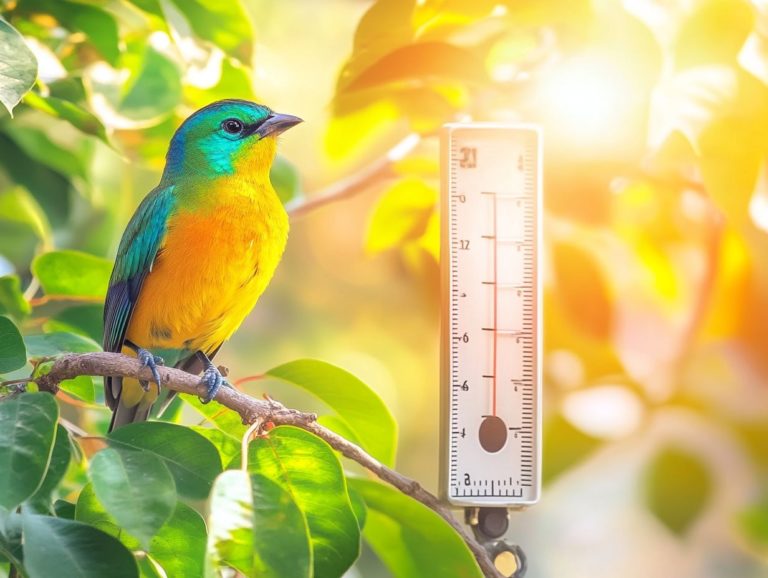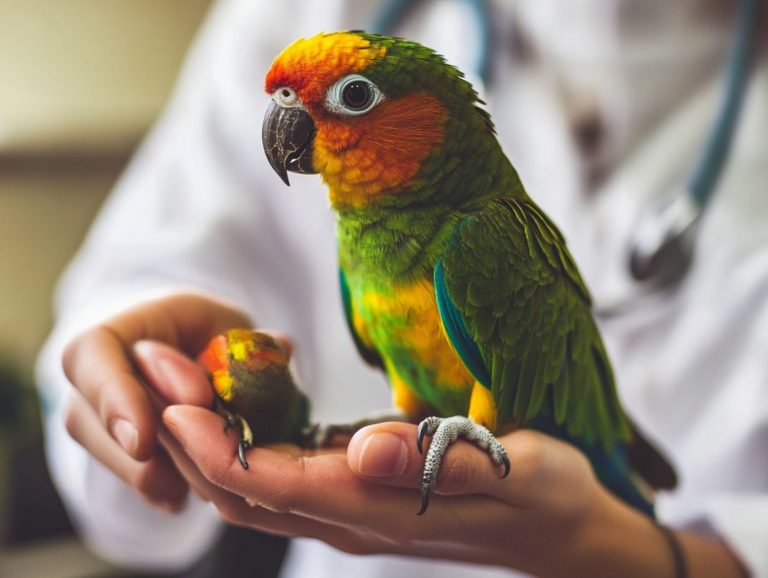5 Warning Signs of Illness in Pet Birds
As a dedicated pet owner, your priority is to ensure your feathered friends are both happy and healthy. Birds have a remarkable talent for concealing their discomfort, which makes it essential for you to recognize the subtle signs of illness.
In this article, you’ll discover five warning signals that may suggest your pet bird is unwell:
- Changes in eating habits, such as loss of appetite
- Abnormal droppings
- Behavioral shifts
- Difficulty breathing
- Physical abnormalities
You will also find insights on preventive measures, treatment options, and tips to promote recovery. Your bird’s well-being relies on your vigilance, so let’s dive in and ensure your feathered friends are happy and healthy!
Contents
- Key Takeaways:
- 1. Changes in Eating Habits
- 2. Abnormal Droppings
- 3. Changes in Behavior
- 4. Difficulty Breathing
- 5. Physical Changes or Abnormalities
- What Are Some Common Illnesses in Pet Birds?
- Frequently Asked Questions
- What are the 5 warning signs of illness in pet birds?
- How can I tell if my pet bird is experiencing changes in behavior?
- What changes in appearance should I look out for in my pet bird?
- Why is it important to monitor my pet bird’s droppings?
- What should I do if my pet bird has a decreased appetite?
- Can respiratory issues be a warning sign of illness in pet birds?
Key Takeaways:
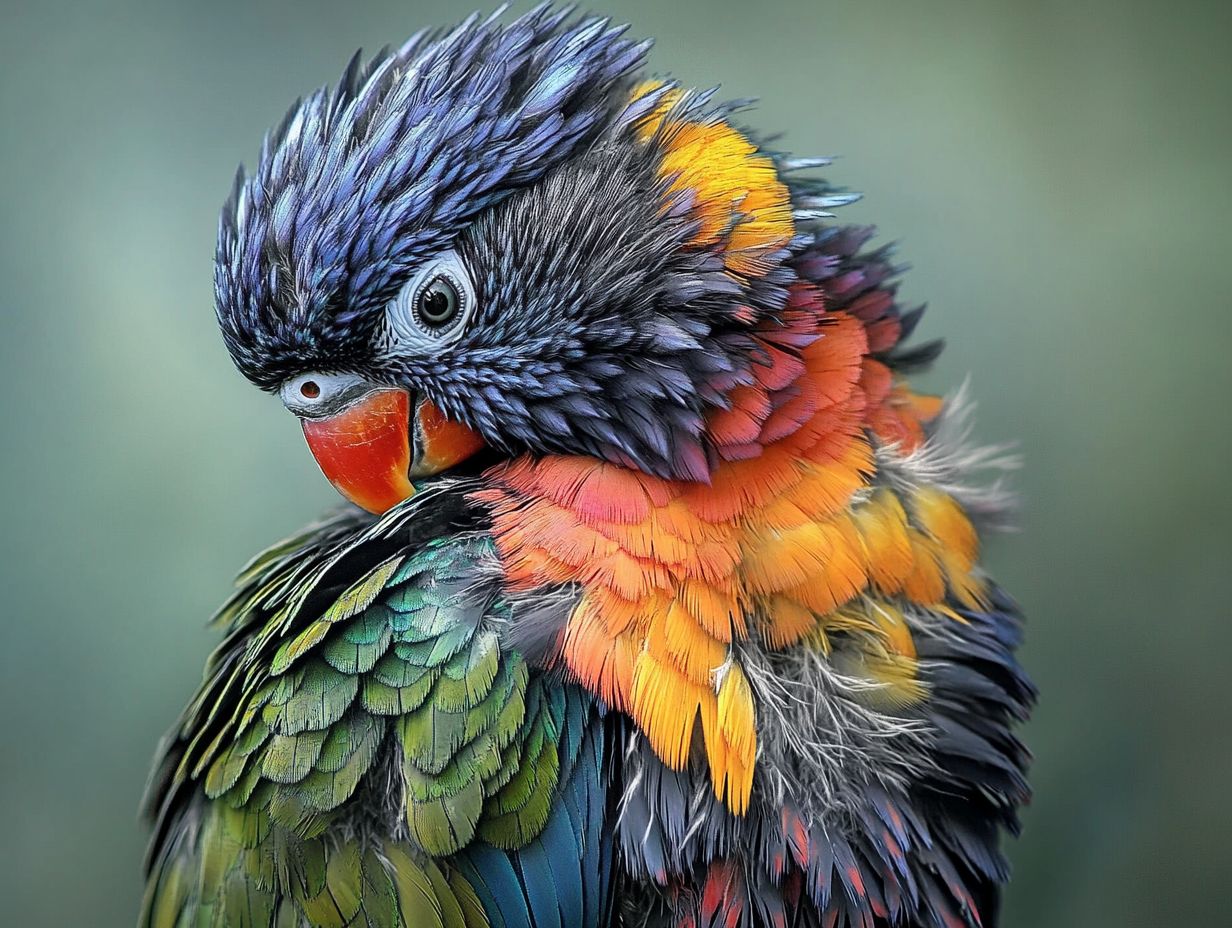
- Changes in eating habits can be a warning sign of illness in pet birds.
- Keep a close eye on your pet bird’s droppings, as abnormal ones can indicate a health issue.
- Any changes in behavior, such as lethargy or aggression, should be taken seriously and checked by a bird vet.
1. Changes in Eating Habits
Changes in your pet bird’s eating habits can serve as critical indicators of underlying health issues. They may be facing illness, pain, or injury. It’s essential for you to be vigilant in observing any fluctuations in their food intake.
Common signs to watch for include a loss of appetite, which may show up as decreased interest in food. Unusual behaviors that further signify distress, such as irritability or isolation, can also be indicators.
Pay attention to any shifts in their food preferences, as this might indicate selective eating due to discomfort or health issues. For instance, if your bird suddenly favors soft, moist foods over harder options, it could suggest dental problems or mouth pain.
Monitoring these changes is crucial, as they can negatively impact your bird’s overall nutrition and well-being. Ignoring these signs can lead to malnutrition and more serious complications.
Therefore, consulting a bird vet for a thorough examination is essential. These professionals specialize in diagnosing and treating dietary issues, helping to ensure that your pet bird remains healthy and vibrant.
2. Abnormal Droppings
Abnormal droppings are a crucial indicator of your bird’s health, often revealing underlying issues that may necessitate veterinary attention. Changes in color, consistency, or frequency can signal a range of problems, from dietary shifts to serious illnesses.
Pay close attention to these changes, as they reveal your bird s well-being. If you notice droppings that are green or yellow, it could suggest potential liver issues. Meanwhile, brown droppings might point to digestive system concerns.
Watery droppings or those filled with undigested food may indicate infections or parasites. Regularly monitoring these changes is vital; even slight alterations can signal distress.
It’s not enough to simply observe these patterns; you should promptly communicate any concerns to a bird vet. Taking these proactive steps ensures timely intervention and better health outcomes for your bird, highlighting the importance of vigilance in their care.
3. Changes in Behavior
Changes in behavior often serve as critical signals that your pet bird may be facing health challenges or distress. You might notice signs such as increased lethargy, irritability, or withdrawal behaviors that demand your immediate attention. To better understand these signs, refer to the top 10 signs of a healthy pet bird.
If your social bird starts isolating or stops playing, it’s a red flag. Changes in eating habits, such as a decrease in food or water intake, may suggest metabolic problems. Recognizing these behavioral cues is crucial, as they often precede more severe health complications. For more information, check out signs of stress in pet birds and how to help.
Therefore, maintaining open lines of communication with your veterinarian is vital. Prompt consultations can facilitate early interventions, ensuring that any health concerns are addressed before they escalate, ultimately safeguarding the well-being of your cherished companion.
4. Difficulty Breathing
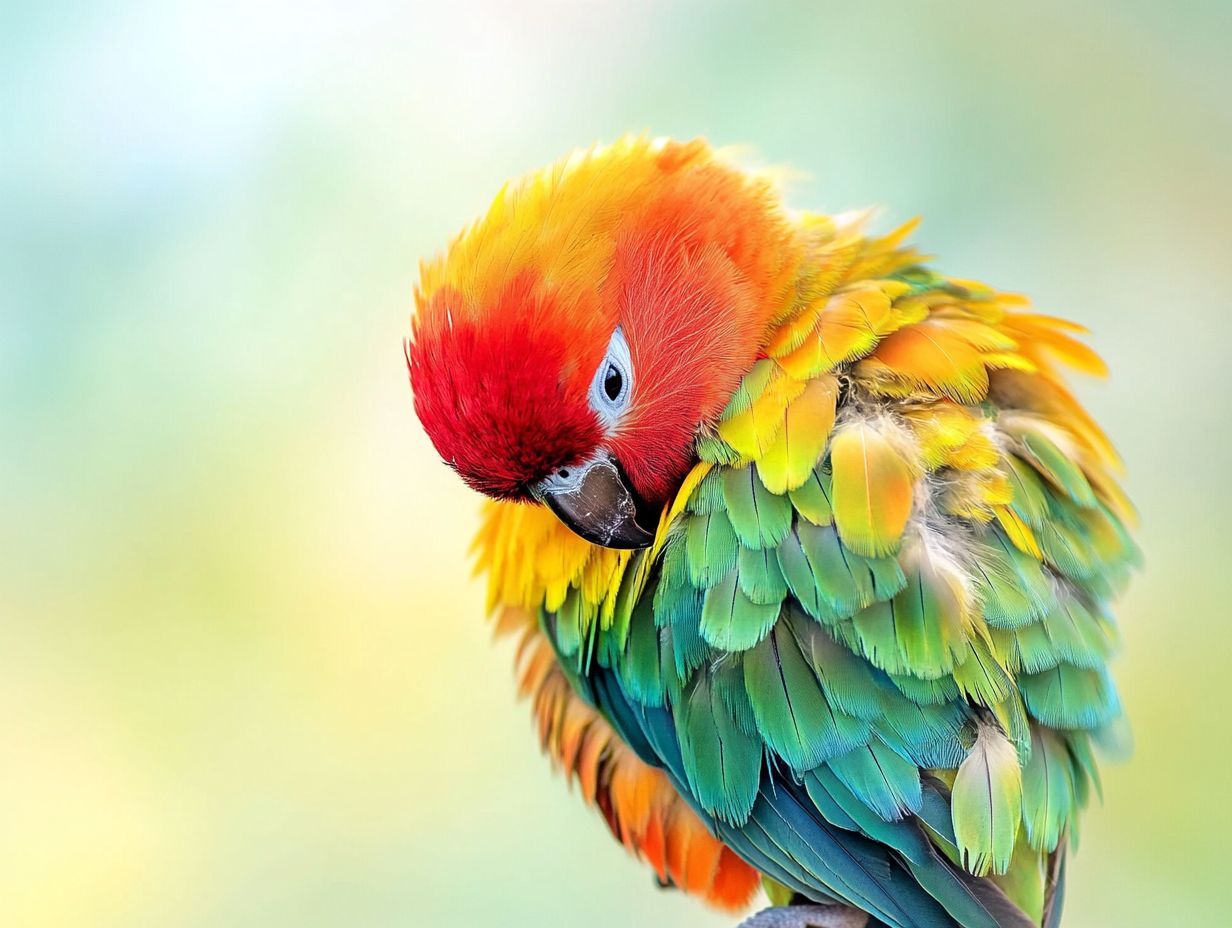
Difficulty breathing in pet birds is not something to take lightly; it can signal serious respiratory problems that demand urgent veterinary attention! If you notice symptoms like wheezing, open-mouth breathing, or an increased respiratory rate, act swiftly. These signs may indicate hidden health problems that could jeopardize your bird s well-being.
Create a safe environment and seek immediate consultation with an avian (related to birds) veterinarian if you observe any signs of respiratory distress.
Keep an eye out for other warning signs, such as lethargy, nasal discharge, or changes in vocalization. These can further hint at respiratory troubles. The causes can vary widely, from environmental stressors like poor air quality or sudden temperature fluctuations to infections from bacteria, viruses, or fungi.
As a responsible bird owner, you must regularly monitor their living conditions and eliminate potential irritants think tobacco smoke, mold, or drafty spots. By maintaining a stable and clean habitat, you can significantly mitigate risks and promote your bird’s overall well-being. Remember, early veterinary assessment is essential for effective treatment and recovery.
5. Physical Changes or Abnormalities
Physical changes or abnormalities in your pet birds can signal serious health issues that warrant professional examination and diagnosis. You should be on the lookout for symptoms like ruffled feathers, swelling, or visible injuries, as these can indicate underlying illness or injury. For more information, refer to our guide on recognizing signs of pain in your pet bird. Early detection through attentive observation can significantly boost the chances of effective treatment and recovery.
Common Symptoms:
Changes in appetite, weight fluctuations, and variations in vocalization can provide critical insights into your bird’s health. A sudden dip in food intake may suggest digestive problems or discomfort, while excessive lethargy could be a red flag for respiratory issues. If you’re concerned about your feathered friend, you might wonder how to tell if my bird is sick.
It s essential for you to remain vigilant and consult veterinary professionals who specialize in avian health for thorough examinations. These experts are trained to spot subtle signs that might escape untrained eyes. This allows for timely interventions that can prevent more serious health complications down the line.
By prioritizing regular check-ups and addressing concerns promptly, such as blood tests and x-rays, you can ensure your feathered companions lead healthier, happier lives.
What Are Some Common Illnesses in Pet Birds?
Pet birds are vulnerable to a range of common illnesses, from respiratory problems to internal bleeding, making it essential for you to stay vigilant about their health. Learning how to spot allergies in your pet bird is a crucial part of this responsibility.
Among the respiratory conditions, pneumonia is a notable concern, often presenting with labored breathing, wheezing, and coughing. Then there’s sinusitis, which can show up as nasal discharge and sneezing. Other issues, like avian pox, may result in skin lesions and lethargy. Recognizing these symptoms is crucial, as seeking prompt veterinary care can avert serious complications.
Along with respiratory problems, you should also keep an eye out for digestive disorders, including psittacine beak and feather disease, which is marked by feather loss and abnormal beak growth. Regular check-ups not only help diagnose these issues early but also allow for preventive measures, ensuring your feathered companion stays healthy and full of life. For more information, you can refer to our guide on how to identify health issues in budgies.
How Can You Prevent Illness in Your Pet Bird?
Preventing illness in your pet birds starts with creating a safe space. Nurturing healthy habits can greatly enhance their quality of life.
By closely monitoring their behavior, you can spot potential issues early. Regular check-ups with an avian veterinarian are vital for your bird’s well-being.
Provide a balanced diet tailored to your bird’s species. A clean living space minimizes the risk of injury or illness.
Gentle handling and encouraging natural behaviors reduce stress and promote emotional health. Stay alert for any changes in your bird’s habits.
Early detection allows for timely intervention. Establish a routine for regular veterinary checkups to address potential health concerns proactively.
What Should You Do If You Notice Any of These Warning Signs?
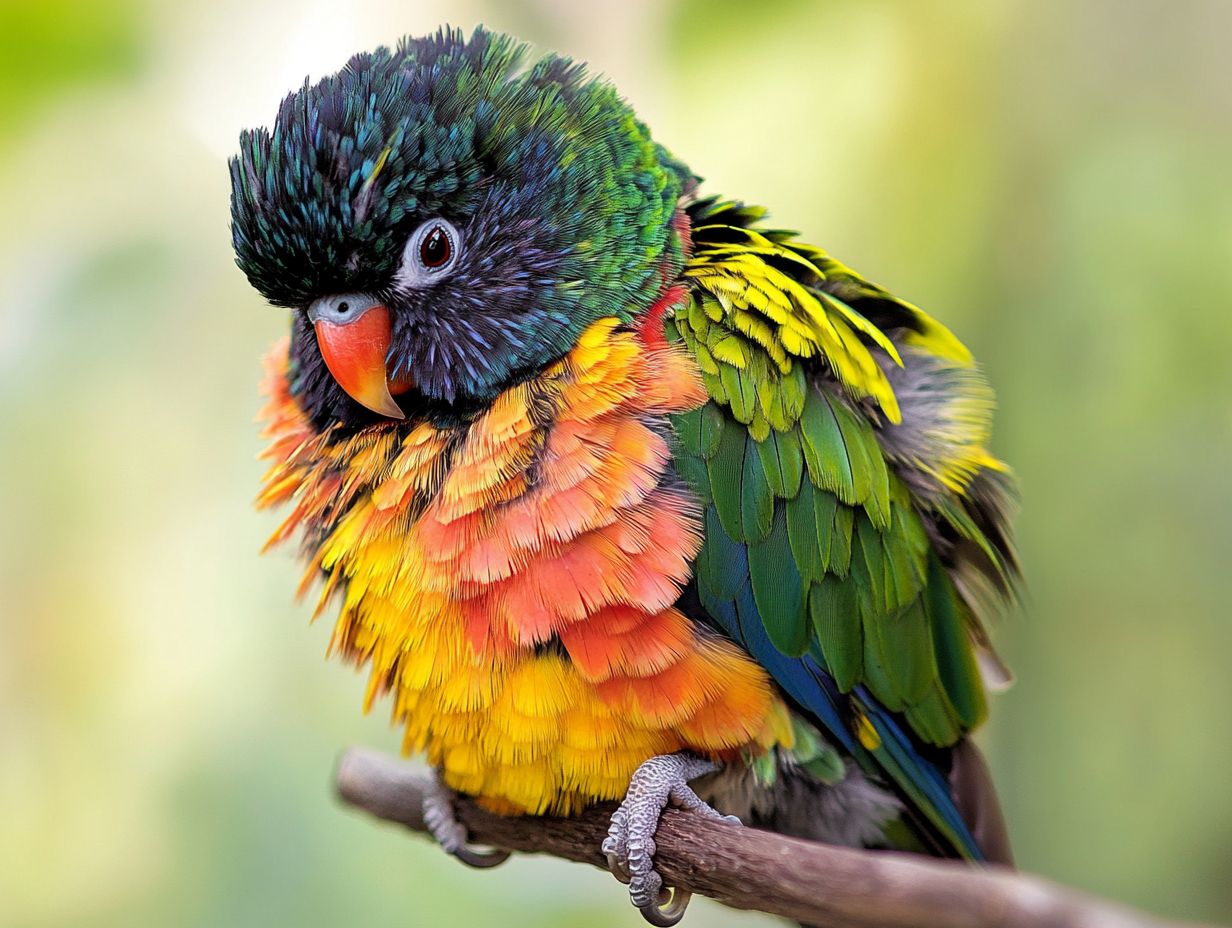
If you notice warning signs like changes in eating habits, unusual droppings, or shifts in behavior, act quickly to safeguard their health. Monitor their condition closely.
Effective communication with your avian veterinarian is key. It ensures your bird receives the right treatment.
Note specific symptoms as they appear. Paying attention to peculiar behaviors or physical changes is crucial.
Consider any environmental changes that might affect your bird s well-being. Quick responses can significantly improve treatment outcomes.
By sharing detailed information about your pet’s condition, you enable your veterinarian to create a tailored treatment plan.
What Are the Treatment Options for Illness in Pet Birds?
Treatment options for pet birds vary based on the diagnosed condition. Each method is carefully customized to meet your bird’s unique needs.
This may involve medications to address infections or inflammation, as well as alternative therapies like herbal solutions.
You play an essential role in this journey. Collaborate with veterinarians to implement dietary changes that promote healing.
Regular diagnostic tests provide clarity on your bird s health. This partnership with veterinary specialists is crucial for effective treatment.
How Can You Help Your Pet Bird Recover from Illness?
Helping your pet bird recover from illness requires a thoughtful approach. Create a safe environment and closely monitor their behavior.
Ensure they have access to proper nutrition and a stress-free atmosphere. Following veterinary instructions is key to a smoother healing process.
Create a comfortable space for rest. This greatly benefits their recovery and reduces unnecessary stress.
Keep a close eye on changes in their behavior, such as eating patterns or activity levels. These insights are invaluable.
Stick to the treatment regimen prescribed by your veterinarian. Regular check-ins help detect potential setbacks early.
What Are Some Additional Tips for Keeping Your Pet Bird Healthy?
Keeping your pet bird healthy requires a thoughtful approach that includes various strategies to promote well-being and prevent illness. This means providing a balanced diet, ensuring a safe living environment, and closely monitoring their behaviors and habits.
Engaging in effective communication with veterinary professionals can further enhance your ability to keep your avian companion thriving.
To achieve optimal health, incorporate a diverse variety of fruits, vegetables, and fortified pellets into your bird’s diet. Be vigilant about eliminating foods that can harm your bird like avocado and chocolate.
Creating a clean, enriched living space is essential. Ensure their cage is free from harmful substances and offers sufficient stimulation through toys and perches.
Regular checkups with a veterinarian, ideally every 6 to 12 months, help detect potential health issues early. By being observant and proactive in these areas, you can significantly enhance your bird s longevity and overall quality of life.
Frequently Asked Questions
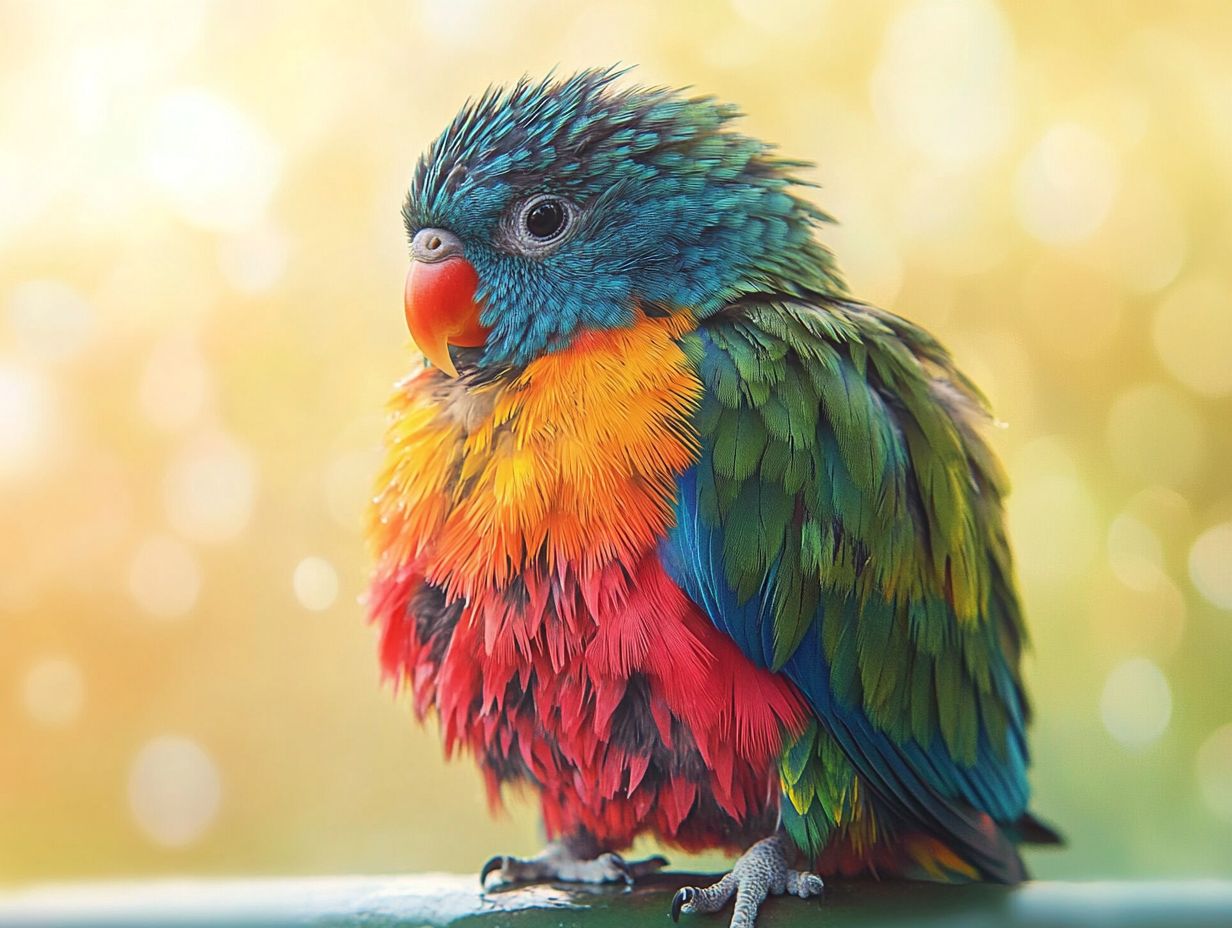
What are the 5 warning signs of illness in pet birds?
- Changes in behavior
- Changes in appearance
- Changes in droppings
- Decreased appetite
- Respiratory issues
How can I tell if my pet bird is experiencing changes in behavior?
If your pet bird is suddenly less active, appears weak or lethargic, or shows abnormal behaviors like excessive grooming or feather picking, it may be a sign of illness. Be sure to check for 6 signs your cockatiel may be sick.
What changes in appearance should I look out for in my pet bird?
Changes in appearance can include poor feather condition, unusual growths or lesions, and discoloration of skin or feathers.
Why is it important to monitor my pet bird’s droppings?
Droppings can indicate your pet bird’s overall health. Changes in color, consistency, or frequency can signal a health issue that requires attention from a veterinarian.
What should I do if my pet bird has a decreased appetite?
A decreased appetite in pet birds can signal illness. If your bird is not eating as much or has completely stopped eating, don’t wait! Seek veterinary care immediately.
Can respiratory issues be a warning sign of illness in pet birds?
Yes, respiratory issues such as difficulty breathing, wheezing, or discharge from the nose or eyes can indicate a health problem in pet birds. It’s important to seek veterinary care if you notice these symptoms in your bird.

